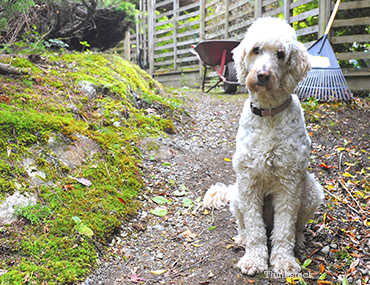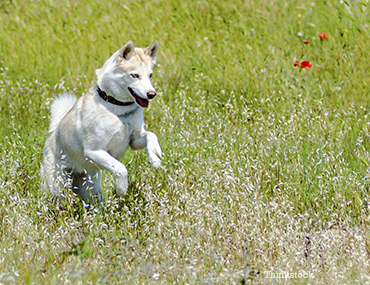a
Dr. Justine Lee's has some green pet care tips for you on Earth Day! For more from Dr. Lee, find her on Facebook!
After attending veterinary school at Cornell in Ithaca, NY, I became a crunchy, hippy, granola-y, recycling fanatic. After all, I like to save dog and cat lives, while recycling one can at a time!
While most pet owners are pretty eco-friendly (after all, we scoop our own dog’s poop, right?), some people may not realize the impact of all those extra carbon footprints that your four-legged dog or cat produce also. So, as we approach Earth day, a few earth-friendly tips for pet owners.
Recycle.
- If you feed your dog or cat canned food, do us all a favor and buy the biggest cans. It’s more ecologic and less metal. Most importantly, recycle those cans.
- Next, save all that extra plastic in your house for poop bags. If you only have cats, save them for your dog-owning friends – they’ll appreciate it! It could be something as insignificant as that bread bag or that cereal box bag; after all, we dog owners will take all that we can get!
- A little hint for when I’m scooping my backyard? I scoop the yard once a week, and only need to use 2 bags in the process. I use one as a glove, and just scoop directly into another empty plastic bag. This helps me reduce my plastic bag use from 7-10 bags a week, to just 2 bags while scooping.

Use reusable, cloth grocery bags.
- At most veterinary conferences nowadays, you can pick up free cloth grocery bags. I love it because I get crazy stares in Trader Joes from the unusual logos (like “Urine-Off”). Most grocery stores now sell $1 reusable sturdy bags. Leave them in your car, and remember to use them. Help minimize the number of plastic or paper bags you are using.
- Instead of bagging your veggies at the grocery store, spare the bag. After all, the one head of broccoli doesn’t really need its own huge bag if you’re cooking it up that night. If you’re short on plastic, grab them from the plastic bag recycling bin in front of the supermarket instead.
Buy in bulk.
- My dog has about 100 rawhides stored in the basement, because I’m a bulk-buying fanatic. The more you buy in bulk, the less packaging and the more cost savings to you. Consider joining a co-op, or better yet, rallying 3-5 colleagues to bulk order pet supplies with you. You’ll save a bundle and minimize the packaging involved.
Boycott plastic bottles.
- While I'm all for staying hydrated, I don’t believe in buying bottled water. Instead, splurge on a BPA-free water bottle instead. They are easy to wash and help minimize the production, manufacturing, and shipping of all those plastic bottles. If you do use plastic bottles, convert them to dog toys when done: simply rinse them out, take off the cap, and throw your dog a chew. My dog loves them, and they are still recyclable afterwards despite all the teeth marks!
Scoop poop.
- How does one go green scooping your kitty litter boxes? Do what I do – use an empty kitty litter pail/container, place it right next to your kitty litter boxes, and line it with a plastic bag. Scoop daily and dump the clumps and waste directly into this pail, cover it, and voila – you’ve scooped without having to waste a plastic bag every day. Once the plastic container is full, just empty it (which is typically once a week in my two-cat household). Personally, this is healthier for your cat (as it makes you more likely to scoop daily), but it also helps minimize the amount of kitty litter and plastic bags that you are using!
- Keep in mind that when it comes to cleaning your liter box, you shouldn’t be dumping all that expensive, landfill-filling kitty litter into the garbage more than 1X/year… instead you just need to scoop out the urine clumps and feces instead (You’d be surprised how many people don’t know this!).
Stop using so much water.

- While I use water for my vegetable garden, I never water my perennial garden or yard. I believe in natural selection when it comes to plant survival, and most yards/gardens survive just as well with minimal watering (they’ll just grow deeper roots or go dormant earlier in the fall).
- Consider using a water barrel. I rigged up a water bucket to catch all that extra, free water from my gutters, and you’d be amazed how many free gallons you get after one good storm! Remember that this water is "dirty", and may contain chemicals from your rooftop and gutters, so only use it appropriately (not on your garden veggies). Instead, I use this “dirty” water to wet down my compost (it needs watering too, you know!) and my potted flowers.
- Yes, I’ll admit it, I’m neurotic. Whenever I have extra water in my house (e.g., if I’m washing and refilling my pets' huge water bowl), I dump the dirty water into a plant container instead of down the drain... saving and reusing every last drop.
Compost and minimize your crap.
- Did you know in Ithaca (home of eco-crunchy, college town of Cornell), you have to pay for garbage by the pound? While this idea wouldn’t work in most of North America (people would just illegally dump and pollute instead), it does motivate you to recycle and compost (otherwise, you have to pay to dump it!). With the simple act of composting (uncooked vegetables from your kitchen), you can dramatically reduce your waste. Minimize your kitchen waste and fertilize your garden too.
- Me? I stop by my local Starbucks during the summer – they actually bag up and give away their used coffee grounds for composting. Coffee grounds are perfect to use as brown material for your compost. It also makes for the best smelling garden ever!
Spay and neuter!
- You’re probably wondering how this reduces our carbon footprint. Well, think about the 8 million pets that are euthanized each year because of pet overpopulation.
- For those that survive and get rescued, each extra animal contributes a small amount towards a carbon footprint also.
There are so many small tasks that we can do at home to help protect our earthly resources. What are you doing to help out?
If you have any questions or concerns, you should always visit or call your veterinarian – they are your best resource to ensure the health and well-being of your pets.
![]()
